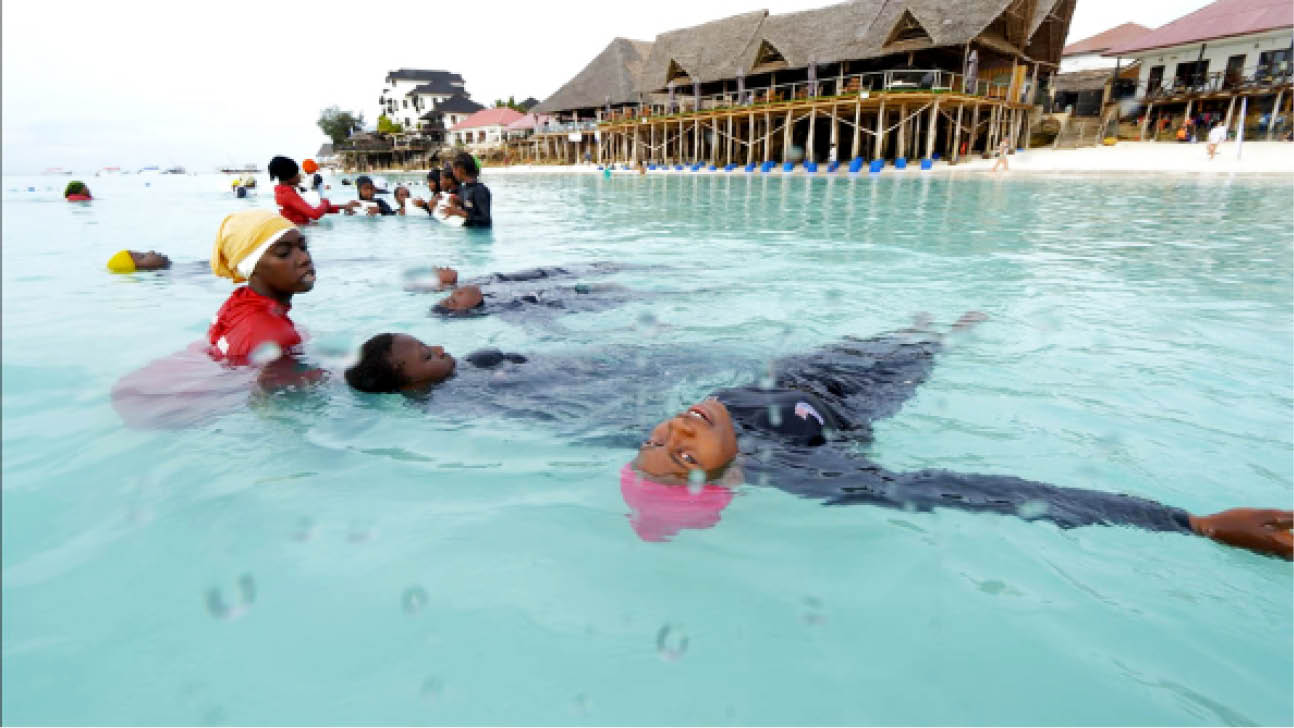Inculcating swimming lessons into school health program
On a Saturday, around a year ago, my family and I received shocking news about a boat mishap involving my colleagues. Tragically, three of them were missing: Hamza, Celestine, and Mustapha. Their bodies were discovered 48 hours later. In their final video ashore, they all wore life vests, which we later learned were faulty. Unfortunately, […]

Girls swimming in Zanzibar island
On a Saturday, around a year ago, my family and I received shocking news about a boat mishap involving my colleagues. Tragically, three of them were missing: Hamza, Celestine, and Mustapha. Their bodies were discovered 48 hours later. In their final video ashore, they all wore life vests, which we later learned were faulty. Unfortunately, this incident was not isolated. Over subsequent months, many other lives were lost due to boat mishaps and drowning.
Notably, on October 31st of the same year, Davido, a famous Nigerian musician, lost his three-year-old son to drowning in their private pool. However, the incident that shook Nigeria the most occurred on April 10, 2024. Junior Pope, a renowned Nollywood actor, and four others lost their lives in a boat mishap while returning from a movie set.
Just a day before that, an Air Force cadet drowned in a swimming pool in Abia State. Shockingly, within two days after Junior Pope’s death, seven more people drowned in Lagos State, including Fawaz Alabi, a well-known supporter of the current president.
While some attribute these tragedies to angry river spirits and engage in rituals by throwing money, drinks, and gifts into water bodies, it’s essential to recognise that these incidents current results from past multi-sectorial failures, but discussion on that is beyond the scope of this piece.
The loss of lives demands urgent attention and comprehensive solutions to prevent further tragedies.
It is crucial to recognise that Nigeria faces a significant drowning challenge within Africa, accounting for over 27,000 reported deaths annually. Remarkably, this constitutes nearly 10 per cent of the global drowning burden.
The metaphor “Those who live in glass houses do not throw stones” underscores the awareness of danger associated with stone throwing. In the context of pools and rivers, expecting non-swimmers to avoid water bodies entirely is unrealistic. Water serves essential purposes, including transportation and recreational activities like pool parties. Therefore, a more practical approach is necessary.
One viable solution is to equip individuals with swimming and floating skills from an early age. Expert swimming instructors recommend starting swimming lessons during childhood. But how early should we begin? The Nigerian education system’s School Health Programme, overseen by the Sports and Health Division of the Federal Ministry of Education, provides an ideal platform. By incorporating expert-guided swimming instructions into school health programs, we can significantly improve survival outcomes in the long run.
While the basic educational level is an excellent starting point, introducing swimming education at the secondary school level will also ensures that individuals acquire essential survival skills by adulthood.
The primary objective of this proposal is to cultivate a swim-and-survive reflex that feels as natural as walking.
By developing the necessary muscle memory and mental agility, individuals can confidently stay afloat in water.
Implementing this approach promises a significant reduction in drowning incidents across Nigeria. Moreover, it addresses the paralysing anxiety that has tragically claimed lives when people accidentally fall into shallow pools.
While this concept may seem unconventional to the average Nigerian, it is already successfully practised in countries like Australia, the Netherlands, and Scotland. Remarkably, Australia reports fewer than 300 drowning deaths annually, the Netherlands around 100, and Scotland approximately 50. These nations have effectively curbed drowning fatalities by taking sustained measures to combat this peril.
However, introducing this policy in Nigeria will pose certain challenges. Many schools lack the infrastructure to accommodate or maintain swimming pools on their premises. Additionally, there’s the risk of children endangering themselves during breaks and after- school hours. Overcrowding in the pools and religious considerations related to gender exposure must also be addressed. Despite these hurdles, exploring this idea further is undoubtedly worthwhile.
I leave you with the haunting words of my dear friend, Dr. Adamu Afrat, as she recounted her near-drowning experience: “As I sank, I struggled, but it felt as though forces from depth were pulling me under. I became tired, that I stopped struggling. As my arms and legs became too weak to obey my plea to keep fighting. I remained conscious as I went under, watching my life flash before my eyes. It was quiet, very quiet. There was water in my senses, my head felt full. Then suddenly, I felt a hand snatch me from the water’s and hauled me to land. It was my friend who
saved me. I still can’t believe that I survived. But Daniel, I remember it all – the helplessness.”
Thank You.
Daniel David Otobo, a medical doctor, can be reached on [email protected]
